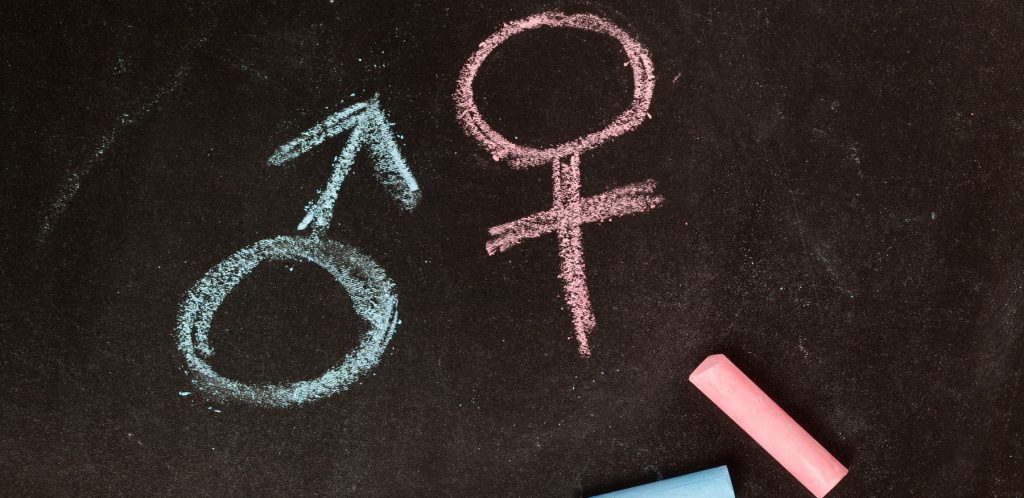A massive issue in the Western world at the moment concerns the question of gender. It is becoming increasingly in vogue to say that while your body may demonstrate you are male or female, it is rather your interior experience that truly determines whether you are a man or a woman.
While there isn’t anything specific to this issue within the Catechism of the Catholic Church, a summary of various magisterial documents and theological reflection can give us some insight into how a person of faith should respond when confronted with this increasingly prevalent viewpoint.
While the Church can — and does — hold that the concept of “gender” and one’s biological sex can be distinct, they are by no means separate from one another. The Church teaches that the body is both instructive and integral to our identity as male and female. This means that while some aspects of masculinity and femininity can find roots in culture more so than nature, there are essential qualities possessed specifically by a man and specifically by a woman. Gender, then, is rooted in the giftedness of our body. What it means to be man and woman — as distinct from the biological difference of male and female — is deeply rooted in the gift of the body. To put this more simply: gender is only properly integrated when it takes its starting point in the gift of the body and its sexual difference.
Gender theories that exist today attempt to undermine this basic fact of the unity between gender and biological sexual difference. While the Church and these theories would agree on the distinction between gender and biological sexual difference, that is about the only common thread between the two. The issue arises when these theories attempt to move the distinction into a real separation: bodily sexual difference (male and female) and gender identity (man and woman) are not really related to each other at all. Rather, they will attempt to argue that the interior experience of a person has no real connection with the body. Thus while the body may be classified as male or female — and this can be altered if they see fit to coincide with interior experience — the interior experience is different to the experience of the body and therefore it is acceptable to change the identifying gender.
This is a simple overview of the position. But this is a complex topic with many varying extremes that is rooted in many false ideological positions. For one, it is rooted in a philosophical position known as dualism, which sees the body and the soul as separated and not really integrated with each other. Thus the body becomes a means of the true interior self’s expression rather than integrated with the inner, spiritual self. It is also of interest that the varying trends in gender ideology keep the “traditional” roles of male and female, but simply allow them to be appropriated by people according to experience. In other words, these theories actually depend on the integrated view of gender and biological sexual difference: without these masculine and feminine aspects, there is nothing for gender ideology to root itself in.
This all being said, there is one other aspect that contains a seed of truth when it comes to gender ideology. It is true that some men will integrate some feminine characteristics and vice versa. Some men may be more inclined, for example, toward receptivity than a lot of other men. This, however, does not negate their fundamental masculinity and femininity; rather, they incorporate these masculine and feminine characteristics according to the sexual difference with which they are gifted.
These ideologies have massive impact on culture and personal experience. And that is the nature of ideologies: they are intentionally forceful. It must also be recognized, though, that things such as gender dysphoria are real afflictions that some have to endure.
The roots of our culture’s focus on gender ideology are many, and it can be argued that there are symbolic and cultural influences that have brought about this issue with greater rapidity than ever before. Regardless, those who struggle with gender identity still require the patient love of Christians to help them bear their cross and to encourage them to find the giftedness of being male and female. This is found through their body and sexual difference.
Real freedom can be found in the Church’s teaching on sexual difference and gender. Seeing them as integrated but also malleable in terms of appropriating certain characteristics of the opposite sex, always respects the gifted nature of existence and of the body: who I am is fundamentally received as a gift, not determined by my own whims and desires. Only in the law of the gift is freedom found.
Father Harrison Ayre is a priest of the Diocese of Victoria, British Columbia. Follow him on Twitter at @FrHarrison. Read more from his Theological Anthropology 101 series here.

